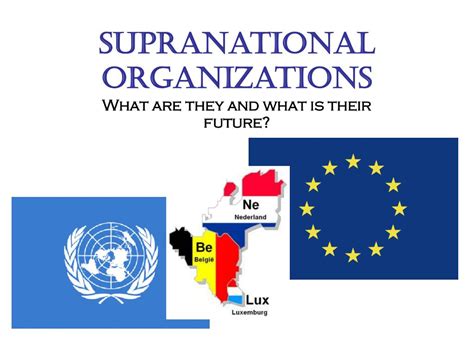Supranational organizations are entities that operate beyond the boundaries of individual nation-states and wield influence over multiple countries. They play a crucial role in fostering international cooperation, addressing global challenges, and promoting economic and social development. Numerous supranational organizations exist, each with its own mandate and areas of operation.

Types of Supranational Organizations
Supranational organizations can be categorized into various types based on their scope and functions:
Intergovernmental Organizations (IGOs)
IGOs are established through treaties between governments. They are owned and managed by their member states and typically focus on specific policy areas, such as trade, security, or environmental protection. Examples of IGOs include the United Nations (UN), the World Trade Organization (WTO), and the North Atlantic Treaty Organization (NATO).
Supranational Unions
Supranational unions are more highly integrated than IGOs and have their own legal personality and powers. They exercise authority over their member states in specific areas and may have the ability to make binding decisions. The European Union (EU) is a prominent example of a supranational union.
International Non-Governmental Organizations (INGOs)
INGOs are not established by intergovernmental agreements but rather by private individuals or organizations. They operate on a global or regional level and advocate for specific causes or interests. Examples of INGOs include the Red Cross, Amnesty International, and Greenpeace.
Supranational Organizations Examples
The following table provides a comprehensive list of supranational organizations, their mandates, and their membership:
| Organization | Mandate | Membership |
|---|---|---|
| United Nations (UN) | Promote international peace and security, and cooperate on economic, social, cultural, and humanitarian issues | 193 member states |
| World Trade Organization (WTO) | Promote free and fair trade among member countries | 164 member countries |
| North Atlantic Treaty Organization (NATO) | Collective security organization for North American and European countries | 30 member countries |
| European Union (EU) | Political and economic union of 27 European countries | 27 member states |
| International Monetary Fund (IMF) | Provide financial assistance to member countries and promote economic stability | 190 member countries |
| World Health Organization (WHO) | Promote global health and well-being | 194 member states |
| Interpol | Global police organization that facilitates international cooperation against crime | 195 member countries |
Functions of Supranational Organizations
Supranational organizations play diverse roles in the global arena, including:
Facilitating International Cooperation
Supranational organizations provide platforms for member states to communicate, negotiate, and collaborate on matters of mutual interest. They create channels for dialogue and help resolve conflicts peacefully.
Governing Global Issues
Supranational organizations establish rules and regulations to govern global issues that cannot be effectively addressed by individual countries. This includes areas such as trade, climate change, and human rights.
Promoting Economic Development
Supranational organizations can provide financial assistance, technical expertise, and trade opportunities to help member countries achieve economic growth and prosperity.
Addressing Global Challenges
Supranational organizations work together to address global challenges such as poverty, disease, and climate change. They coordinate efforts, mobilize resources, and advocate for policy solutions.
Enforcing Laws and Regulations
Some supranational organizations, such as the European Union, have the authority to enforce laws and regulations on their member states. This ensures compliance with agreed-upon rules and standards.
Benefits of Supranational Organizations
Supranational organizations offer numerous benefits:
Enhanced Cooperation
They facilitate cooperation between countries, fostering dialogue and collaboration on global issues.
Global Governance
They provide a framework for global governance, establishing rules and regulations to address cross-border challenges.
Economic Integration
They promote economic integration, reducing trade barriers and facilitating the flow of goods and services across borders.
Conflict Prevention and Resolution
They help prevent conflicts between member states through diplomacy and mediation efforts.
Humanitarian Assistance
They provide humanitarian assistance to countries in need, addressing issues such as poverty, health emergencies, and natural disasters.
Challenges Faced by Supranational Organizations
Despite their importance, supranational organizations face certain challenges:
Sovereignty Concerns
Member states may be reluctant to cede sovereignty to supranational organizations, fearing loss of control over their domestic affairs.
Bureaucracy and Inefficiency
Some supranational organizations can be bureaucratic and inefficient, slowing down decision-making and implementation of policies.
Political Differences
Political differences between member states can hinder consensus and cooperation within supranational organizations.
Funding Issues
Supranational organizations rely on contributions from member states, which can be unreliable or insufficient.
Future of Supranational Organizations
Supranational organizations will continue to play a vital role in the global landscape. As the world becomes increasingly interconnected, the need for international cooperation and global governance will only increase. Supranational organizations are well-positioned to meet these challenges and shape the future of international relations.
To enhance their effectiveness, supranational organizations must adapt to evolving global realities. They should embrace innovation, improve their decision-making processes, and strengthen their accountability mechanisms. By doing so, they can continue to serve as essential instruments for global cooperation, progress, and prosperity.
